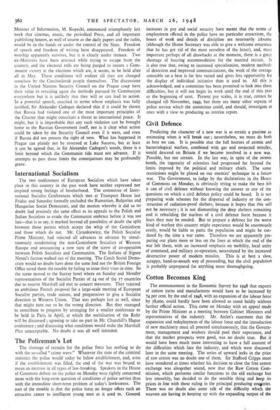The Policeman's Lot
The shortage of recruits for the police force has nothing to do with the so-called "crime wave." Whatever the state of the criminal statistics the police would today be below establishment, and, even if the establishment was filled, the end of the war was bound to mean an increase in all types of law-breaking. Speakers in the House of Commons debate on the police on Monday were rightly concerned more with the long-term question of conditions of police service than with the immediate short-term problem of today's lawlessness. The root of the trouble is that the police force no longer offers such an attractive career to intelligent young men as it used to. General
increases in pay and social security have meant that the terms of employment offered in the police have no particular attractior% the hours of work and details of discipline are necessarily irksome (although the Home Secretary was able to give a welcome assurance that he has got rid of the most senseless of the latter), and, most important perhaps of all drawbacks at the moment, there is a great shortage of housing accommodation for the married recruit. It is also true that, owing to increased specialisation, modern methods of detection and improved communications, the work of the average constable on a beat is far less varied and gives less opportunity for the display of individual initiative than it used to. All this is acknowledged, and a committee has been promised to look into these difficulties, but it will not begin its work until the end of this year 02 the beginning of next. Present pay scales, it is true, cannot be changed till November, 1949, but there are many other aspects of police service which the committee could, and should, investigate at once with a view to producing an interim report.


































 Previous page
Previous page